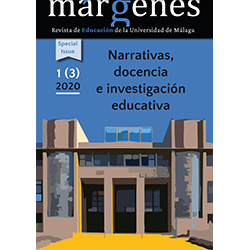Biographic earning and training
DOI:
https://doi.org/10.24310/mgnmar.v1i3.9770Keywords:
continuous training, life stories, experiential knowledge, biographical learning, biography of learningAbstract
The notion of biographical learning is elaborated in the field of continuous professional training: it is linked to the recognition of knowledge and competences derived from experience and it includes training approaches and content for the individualization of personal and professional trajectories. Likewise, it brings to the surface the founding role of the biographical relationship in training, the training processes through life stories, giving access to the experiential dimension of learning processes and to the biographical construction logic from which the acquisition and the appropriation of knowledge derive. With the notions of experience knowledge, the biographical constitution of knowledge, the notion of biographical learning contributes to framing a biographical theory of learning.
Downloads
Metrics
Publication Facts
Reviewer profiles N/A
Author statements
Indexed in
-
—
- Academic society
- N/A
- Publisher
- Universidad de Málaga
References
Alheit, P. y Hoerning, E. M. (1989). Biographisches Wissen: Beiträge zu einer Theorie lebensgeschichtlicher Erfahrung. Campus.
Alheit, P. y Dausien, B. (2002). Bildungsprozesse über die Lebensspanne und lebenslanges Lernen. In Tippelt, R. (Ed.), Handbuch Bildungsforschung, (pp. 565-585). Springer VS.
Alheit, P. y Dausien, B. (2004). Les processus de formation et l’apprentissage tout au long de la vie . L’Orientation Scolaire et Professionnelle, 33(4), 495-497.
Baacke, D. y Schulze, T. (1979). Aus Geschichten lernen. Zur Einübung pädagogischen Verstehens. Juventa.
Dominicé, P. (1990). L'histoire de vie comme processus de formation. L'Harmattan.
Dominicé, P. (1999). La compétence d'apprendre à l'âge adulte: lectures biographiques des acquis de la scolarité. In Dominicé, P. et al. (Eds), Les origines biographiques de la compétence d’apprendre, 87, (pp. 1-23). Université de Genève.
Dominicé, P. (2001). Défendre l’indiscipline théorique pour penser la formation. In Althait, P., et al. (Eds.), Regards pluriels sur l’approche biographique: entre discipline et indiscipline, 95, (pp. 51-72). Université de Genève.
Dubar, C. (2000). La formation professionnelle continue. La Découverte.
Farzad, M. y Paivandi, S. (2000). Reconnaissance et validation des acquis en formation. Anthropos.
Henningsen, J. (1981). Autobiographie und Erziehungswissenschaft: fünf Studien. Neue Deutsche Schule.
Hoerning, E. M. (1989). Erfahrungen als biographische Ressourcen. In Alheit, P. y Hoerning, E. (Eds), Biographisches Wissen. Beiträge zu einer Theorie lebens-geschichtlicher Erfahrung, (pp. 148-163). Campus.
Lainé, A. (1998). Faire de sa vie une histoire. Théories et pratiques de l'histoire de vie en formation. Desclée de Brouwer.
Legrand, M. (1993). L'approche biographique. Desclée de Brouwer.
Loch, W. (1979). Erziehung und Lebenslauf. Neue Deutsche Schule.
Pineau, G. y Marie-Michèle. (1983). Produire sa vie: autoformation et autobiographie. Editions Saint Martin
Pineau, G. y Le Grand, J. L. (1993). Les Histoires de vie. Presses Universitaires de France (PUF).
Pineau, G., Liétard, B. y Chaput, M. (1997). Reconnaître les acquis. Démarches d'exploration personnalisée. L'Harmattan.
Schulze, T. (1985). Pädagogische Biographieforschung. Orientierungen, Probleme, Beispiele. Wienheim/Basel.
Schulze, T. (1999). Erziehungswissenschaftliche Biographieforschung. Anfänge, Fortschritte, Ausblicke. In Krüger H. H. y Marotzki, W. (Eds), Handbuch Erziehungswissenschaftliche Biographieforschung. Leske + Budrich
Schütz, A. (1981). Der sinnhafte Aufbau der sozialen Welt. Suhrkamp.
Schütz, A. (1987). Le Chercheur et le quotidien. Méridiens Klincksieck.
Schütz, A. y Luckmann, T. (1979). Strukturen der Lebenswelt, 2º ed. Suhrkamp.
Gebauer, G. y Wulf, C. (1998), Spiel - Ritual - Geste. Mimetisches Handeln in der sozialen Welt. Rowohlt.
Downloads
Published
How to Cite
Issue
Section
License
The editorial team of Márgenes supports an open Access policy of scientific knowledge. apostamos claramente por una política de acceso abierto del conocimiento científico (see Berlin Declaration).
Authors with work published in this journal accept the following conditions:
- This journal provides immediate free access to its content under the principle of making research freely available to the public. All contents published in Márgenes are subject to the Creative Commons Reconocimiento-SinObraDerivada 4.0 Internacional
It is the responsibility of the authors to obtain the necessary permissions of the images that are subject to copyright.
Authors whose contributions are accepted for publication in this journal will retain the non-exclusive right to use their contributions for academic, research and educational purposes, including self-archiving or deposit in open-access repositories of any kind.
The electronic edition of this magazine is edited by the Editorial of the University of Malaga (UmaEditorial), being necessary to cite the origin in any partial or total reproduction.
- Authors can enter into other additional independent contractual agreements for the non-exclusive distribution of the version of the article published in this journal (e.g. including it in an institutional repository or publishing it in a book) on the condition that they clearly indicate that the work was originally published in this journal.
- Authors are allowed and recommended to publish their work on the Internet (for example on institutional and personal websites), before and after the publication, as this could lead to constructive exchanges and a more extensive and quick circulation of published works (see The Effect of Open Access).















